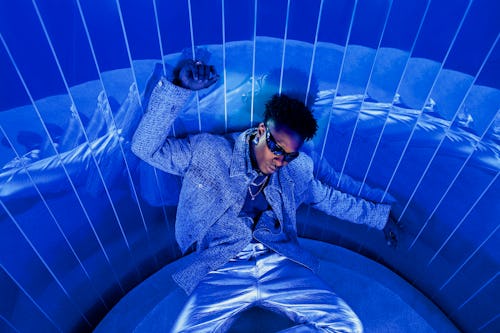
Lucky Daye knows what he wants, but he doesn’t always allow himself to have it. He conducts experiments in self-control, exercising his ability to abstain from the things he loves most. Today, it’s french fries.
It’s a balmy spring afternoon, and we’re having brunch at Bubby’s, a popular Tribeca restaurant. We’ve decided to share what feels like most of the menu: pancakes, fried chicken, avocado toast, and an eggs Benedict with smoked salmon. Daye takes off his watch — it’s an Audemars Piguet, and he’s worried about scratching it — as he explains why he has drawn the line at fries: “I like the challenge. I just did it to test my discipline.”
Daye says he once went on a “sexual fast” for “a whole year,” a surprising admission for an R&B singer whose most recent release — his second LP, Candydrip — includes a delightfully horny gospel dedicated to the sounds his partner makes during sex. He likens his fast to Mike Tyson not fucking before his fights. “Weeks or months sometimes, you have to train without any type of ejaculation,” he explains. According to Daye, the benefits of these sex-free stints are manifold. He’s more productive. He saves time. He has more energy to funnel into his work. “They underestimate the power of life,” he says, pausing for a moment. “We're holding it inside of us.”
I had already witnessed how carefully Daye allocates his energy on the set of his photo shoot for this story in Los Angeles. As the camera clicked, I watched him scan the faces hovering around the playback monitor. He oscillated between impish, almost childlike bursts of energy and quiet moments of bashfulness, lighting up with each tiny bit of affirmation. By the end of the shoot, it was clear the carping eyes of the Greek chorus had drained him; he asked the photographer to clear the room.
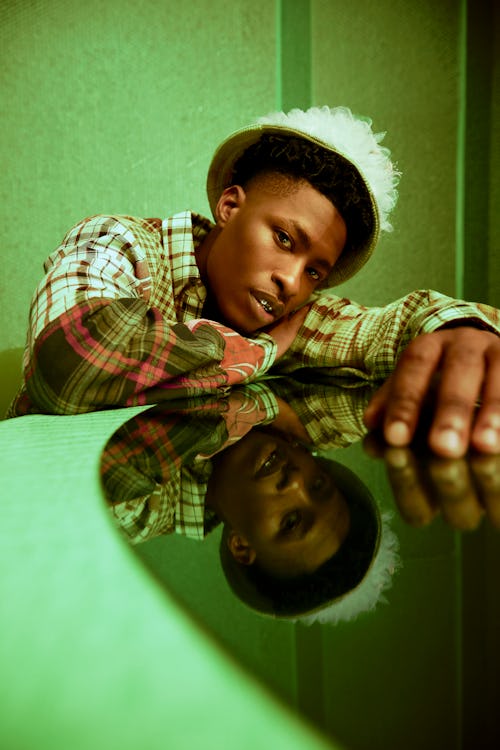
Still, when Daye is called to deliver, he holds nothing back. It’s evident in the urgency of his live performances and laid bare in his raw, unwavering falsetto. It comes through in the vulnerability that permeates Table For Two, his 2021 EP musing on the difficulties of social-media-era dating, which won Best Progressive R&B album at the Grammys this year, and in how he talks about his fans, who refer to themselves as Daye Ones.
“I want people to really just know when I say I love [my fans], I really mean that,” he tells me. “I'm literally doing it because I feel like I owe them. I guess that's like owing God.”
Daye often seems incredulous he’s gotten this far. I tell him his song, “Over,” happened to be playing as I walked into the restaurant. “Nah, seriously?” he says, his face animated. Earlier this year, when Table For Two earned him his sixth Grammy nomination, he wasn’t present to accept the award. He tells me he was on the red carpet when they called his name. He didn’t expect to win and didn’t even have a speech prepared.
Daye has a devoted fan base, but he’s not yet a household name like generation-defining alt-R&B voices like SZA and Frank Ocean, nor has he reached the level of critical consensus contemporaries like Brent Faiyaz and Daniel Caesar have. Candydrip, released in March 2022, is his first album to crack the Billboard 200. His music — threaded with expansive influences, both modern and classical, straddling ‘70s funk, New Orleans jazz, and ‘90s R&B — feels deeply lived in. His soulful melodies, anchored by lush, sinuous composition, have a timeless quality, but still manage to maintain a sticky pop sensibility. Daye looks and sounds like a superstar. Why isn’t he one yet?
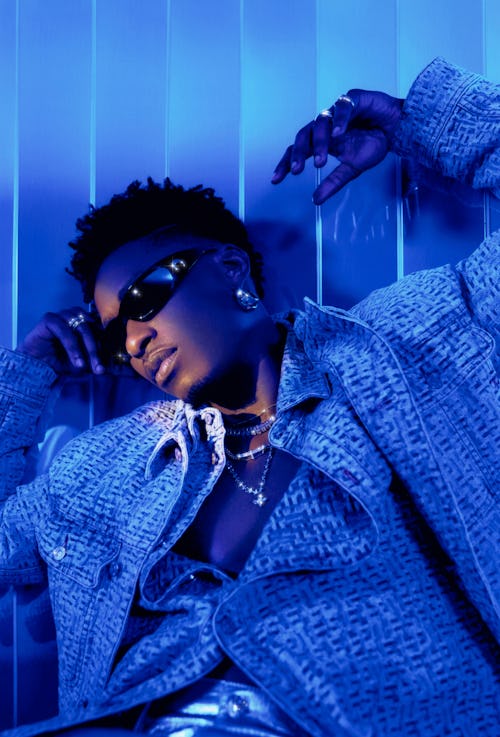
“I'm just grateful. I don't feel like I'm entitled to any of it,” Daye says when I ask him if he thinks the album deserves more recognition. “I don't feel like my song's supposed to be going crazy on TikTok. I don't feel like my song's supposed to be on the radio, or people are supposed to listen to me. I'm just happy to be able to make it.”
He grew up in New Orleans and spent his early childhood in an extremist Christian church that he has described as a religious cult. The church, which his parents joined before he’d been born, restricted mainstream music, television, and even certain instruments; all things secular were seen as a sin. “You telling me if I play instruments, I'm going to burn forever? It was full of fear," Daye has said of his experience. His musical talents revealed themselves in unlikely places; he credits his ear for effortless melodies to the rhythmic cadence of Dr. Seuss books.
I ask him how he makes sense of his time in the church and how he places it in the larger context of his life. “I hold onto all my good memories,” he says. “I remember the bad, and then I try to understand what it is and find the good shit.”
The neighborhood he grew up in, the Seventh Ward, was destroyed by Hurricane Katrina in 2005, when the levees buckled, and many homes remained that way for more than a decade. The family left the city for Tyler, Texas. Daye’s first moment in the spotlight came at 19, on the fourth season of American Idol. He shuffled into the room wearing a white tee and oversized jeans, braids grazing his chin. Gene Simmons asked Daye, competing under his born name David Brown, why he wants to do this. “I’m following my heart. This is where my heart is now,” he purred.
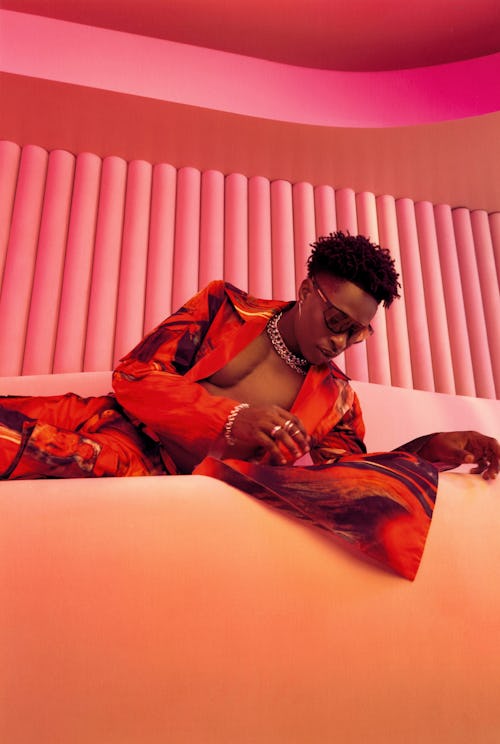
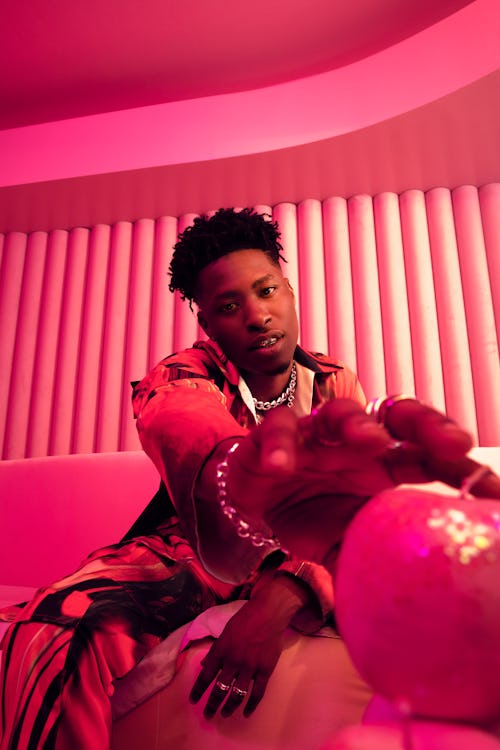
Ultimately, Daye’s belief in his own gifts superseded his strict religious upbringing and he decided to move to Atlanta to pursue music in earnest. His come-up was slow and circuitous; he earned some cash writing songs for artists like Ne-Yo, August Alsina, and Boyz II Men, but he wasn’t breaking through the way he had hoped. He kept a Google Doc listing the producers who had gave him their numbers but ultimately rejected him. At one point, it had 223 names. He decided it was time to switch up his strategy; he packed up his possessions and drove across the country to Los Angeles without stopping to sleep. The months after the move marked a low point in Daye’s life; he was lonely, hopeless, and, for a stint, homeless. “I was trying to die, literally,” he says. “I was on the street. Not eating, not doing nothing. I was like, you know what, if this supposed to be my fate…” He describes it as a period of waiting on an open door.
Daye’s fate crystallized when he crossed paths with producer and instrumentalist Dernst Emile II, known as “D’Mile,” in 2011. Both musicians were exhausted by industry gatekeepers and determined to make something happen for themselves. Together, they notched the hit that put Daye on the map, 2018’s “Roll Some Mo.” The duo continued to hone their chemistry on Daye’s debut album, Painted, which they produced with DJ Camper over the course of a year. By the time they finished, in 2018, Daye was signed to Keep Cool Records and RCA Records. He has collaborated with D’Mile on every project since.
Instead of making him cynical, Daye’s brush with rock bottom made him understanding. Once he was out on his own, he could see that empathy also gave him the ability to assess the intentions of others — to intuitively locate their motivations, and use that information to his advantage. He learned to deploy his emotional intelligence like a concealed weapon. “People think communication is about saying stuff, no — it's about actually about listening,” Daye observes.
He recalls spending mornings reading alone on downtown LA rooftops and counts motivational manifestos like Napoleon Hill’s Think and Grow Rich and Dale Carnegie’s How to Win Friends and Influence People among his favorite books. In the latter, published in 1936, Carnegie writes, “If there is any one secret of success, it lies in the ability to get the other person’s point of view and see things from that person’s angle as well as from your own.”
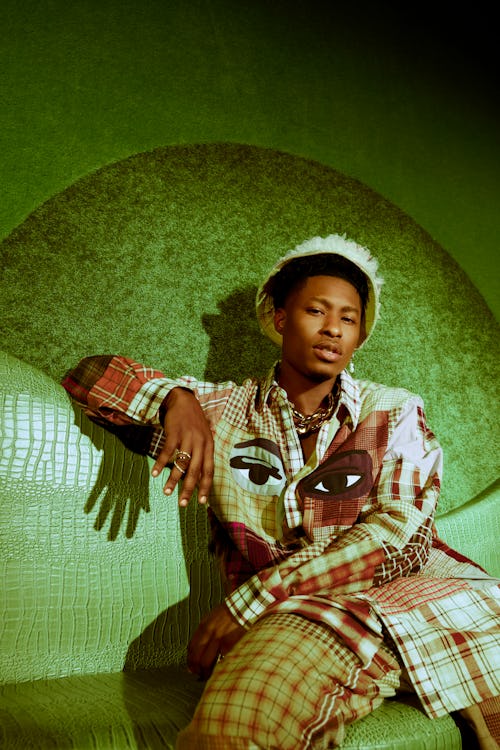
Daye’s curiosity is not contrived; he is deeply interested in others. He asks me about my childhood. He worries about a stranger’s dog stepping on glass. A fan interrupts us for a photo, visibly trembling with excitement, and he obliges. Sensing Daye’s willingness to please, she gets greedy and asks him to do a TikTok with her. Before he can give in, I tell her we need to get back to our interview. Daye flashes me a relieved smile.
He remembers my sign, Cancer, from the first time we met. “You guys are sensitive,” he says. “You love hard and hermit-crab if somebody hurts you.” He summarizes his sign, Libra, saying, “We're about justness and fairness,” and asks for the date I was born so he can look it up in what he describes as “the GOAT book,” which equates birth dates to specific playing cards. Born on Sept. 25, Daye is the queen of hearts, known for sensitivity and natural charm. “Usually women are born on this day,” he says.
Decades removed from the church, astrology hits different for Daye. “It's not a belief system at all, but if you understand God, you can create your own belief system,” he muses. “The zodiac is more like you know yourself better. And it's a cheat code.”
As he polishes off the pancakes, I note that we’re the same age. “If you’re checking Google, you're wrong,” he fires back. I playfully ask to see his ID, and he declines, becoming visibly ruffled. “I block everybody that tells me happy birthday,” Daye says. “I live by the sun and the moon. I don't even look at my clock. They have to tell me when to be places. I don't even use my phone,” he explains.
I ask him if his rejection of the concept of time might be a way to reclaim some of the childhood he lost being raised in a restrictive church. “Sometimes I can feel like that,” he admits. “I feel like I might have missed stuff. That's why I listen to music so much. I try to go back to stuff that I wasn't allowed to listen to. I missed 10 years of being a kid.”
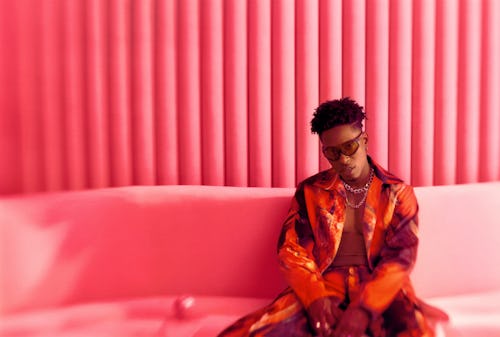
He continues: “I don't believe in [birthdays] because I don't want to be subject to it. And you are what you believe. So when you turn 50, you will look 50 … if you believe in it.”
He’s referring to a 1999 interview with Prince, where the singer lays out a similar philosophy. “I don’t celebrate birthdays, so that stops me from counting days, which stops me from counting time, which allows me to still look the same as I did 10 years ago,” Prince explained to Dutch TV presenter Ivo Niehe.
Mainly, though, Daye’s issue with time is how we use it as a marker for comparison, a method for measuring one person’s life against another’s. “They'll be like, LeBron's good at 30. And it's like, no, he's just good. Why are you comparing his greatness to all of this other stuff? Just let him be great.”
Avoiding the comparison trap has served Daye well. His biggest hit to date, “Over,” currently has 70 million Spotify streams. Like many of the songs on the new album, “Over” is preoccupied with a love affair that alternates between intimacy and ambivalence. “You keep on making me leave/Nightmares turned into a dream/If you're so toxic to me, what am I fiending?” he sings.
“I know better than to go back to a relationship, but a lot of other people don't,” Daye says of the song. “So I sing for them. I don't write all my stuff from just my life, I write from what I see. I write from what I feel from people when I'm watching. I'm a people watcher.”
Daye admits he’s “a fool for romance,” but he still maintains a clear-eyed view of how far feelings can go. “My perception of what love was supposed to be all my life was when you love somebody, you just do everything you're supposed to do. You give them your life, you live in a shack with them, or you live in a mansion,” he explains. “And then I grew up, and I realized it's not true. They're not going to live in a shack, but they would live in a mansion.”
A keen observer, Daye has realized that being successful won’t completely insulate you from heartbreak, but being perceptive might.
“I realized that the golden rule is backward,” Daye says, pausing for a moment. “You don't treat other people as you would like to be treated — you treat them as they would like to be treated.”
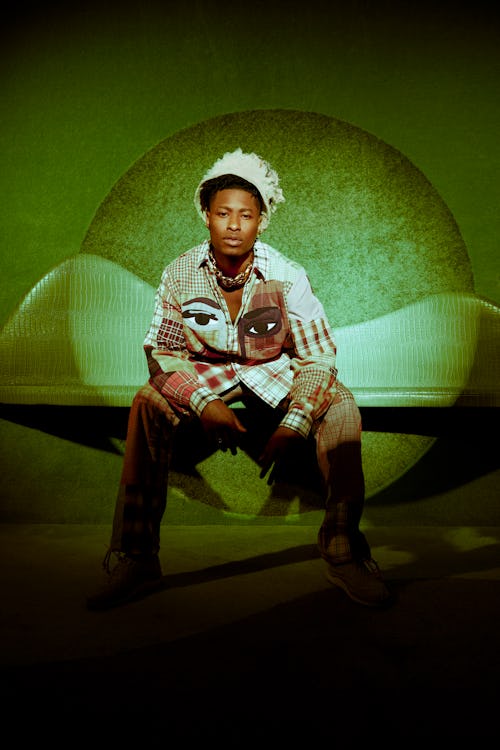
Top Image Credits: Diesel jacket, shirt, pants; Slim Smith sunglasses; 8 Other Reasons necklace, earrings; ASOS boots
Photographer: Kajal
Executive Producer: Shanté Cosme
Executive Producer: Spike Jordan, Mike Prieto
Producer: Jami Arceo
Production Designer: Jason Garofolo
Digitech/Photo Assistant: Caleb Shane
Lighting Assistant: Alex Perez
Photo Assistant: Jeff Salomon
Art Director: Heidy Orellana
Stylist: Parker Harwood
Stylist Assistant: Justin Trent Johnson
Groomer: Tracy Love
Production Coordinator: Kaziah Thorn
Production Assistants: Noah Donnelly, Sydney Gates
Production Company: Genius Productions
Retoucher: Shane Caleb, Lily Moffet
Bookings: Dan Resnick







